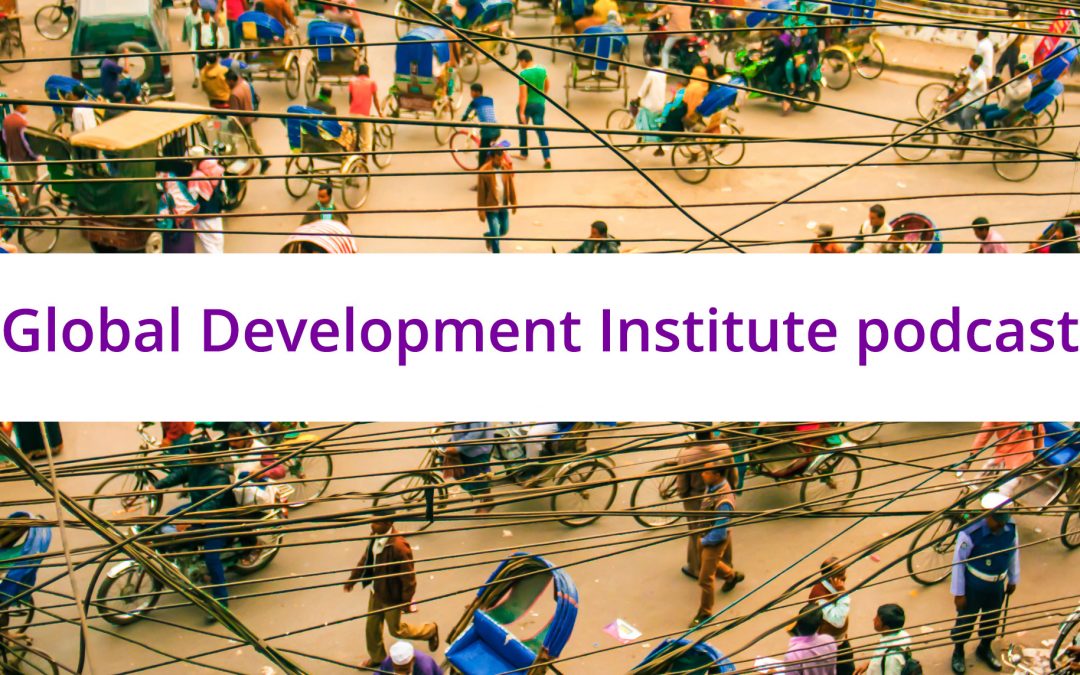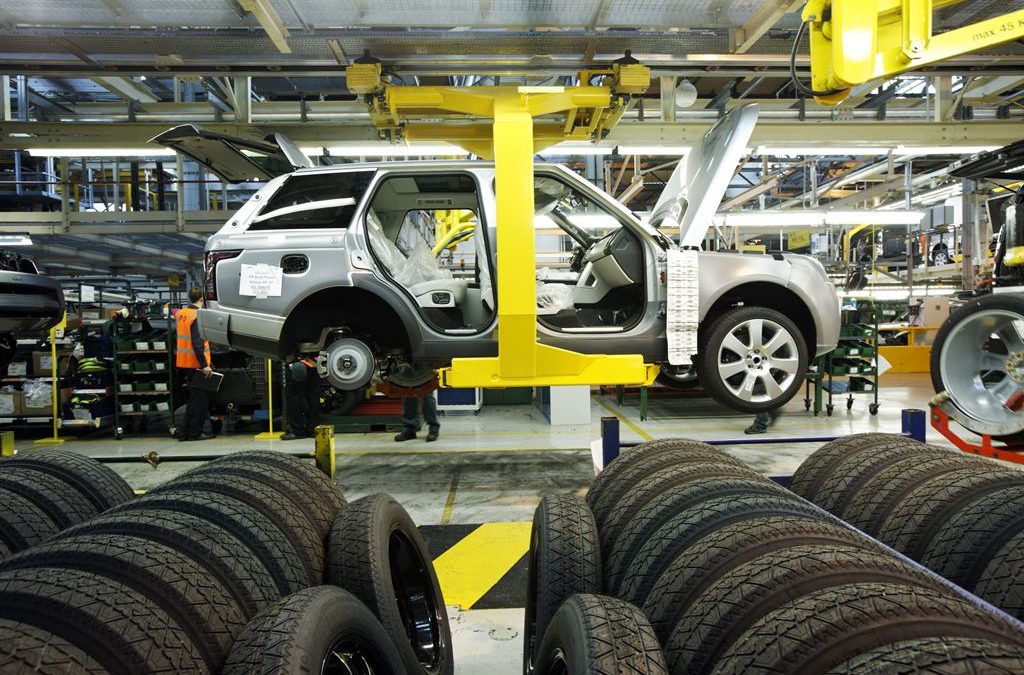
GDI Lecture Series: The Southernisation of Development with Emma Mawdsley
Dr Emma Mawdsley gave a lecture entitled ‘The Southernisation of Development? Who has ‘socialised’ who in the new millennium?’. You can listen to the podcast, or watch the lecture below.
Emma had a bad cold during the talk so the recording was ended slightly before the end of a lecture due to a coughing fit!
Note: This article gives the views of the author/academic featured and does not represent the views of the Global Development Institute as a whole.

Podcast: How to rig an election (and get away with it) – Nic Cheeseman
On 8th October we were delighted to host Professor Nic Cheeseman to delivers a talk about his new book How to rig an election. In the talk he argues that contrary to what is commonly believed, authoritarian leaders who agree to hold elections are generally able to remain in power longer than autocrats who refuse to allow the populace to vote.
For more on Nic Cheeseman:
You can subscribe to the podcast on:
- Spotify
- iTunes
- Stitcher
- Soundcloud
- Castbox
- RSS
- tunein
- Pocket Cast
- and most other leading podcast services.
Note: This article gives the views of the author/academic featured and does not represent the views of the Global Development Institute as a whole

Reflections on an embedded approach to research with impact
Dr Joanne Jordan, Honorary Research Fellow, Global Development Institute
Academics in the UK are now working in a context in which doing research that has societal ‘impact’ is an increasingly important requirement for funders, institutions and scientific bodies. But, before the ‘impact agenda’ emerged, like many climate change and development focused academics, my main motivation for becoming a researcher was a passion to contribute towards social change.
So, how can we create engagement and impact with our research? Drawing on my experiences of developing ‘The Lived Experience of Climate Change’ project based on my research looking at urban climate resilience and how land tenure affects adaptation to climate change in Dhaka, Bangladesh, I highlight some key lessons for effective public and stakeholder engagement and impact. read more…

Hrishipara daily financial diaries: Receiving Gifts in Low-Income Households
Since May 2015 we have been conducting a ‘financial diary’ research project in central Bangladesh in which we record, each day, all the transactions made that day by our ‘diarists’ (as we call our volunteer respondents). You can read more about the project on its website here. In this blog we explore the role of gifts in the households of our diarists.
Gifts received from outside the household
 We have recorded just over a thousand transactions in which a diarist household has received a money gift from someone outside the household. This is a tiny fraction of the more than half a million transactions we have recorded, but the total value of these gifts is not negligible. You can get an idea of their scale relative to the economies of the receiving households in Chart 1, which shows the gifts our 72 diarists have ever received[1] as a proportion of their total income[2].
We have recorded just over a thousand transactions in which a diarist household has received a money gift from someone outside the household. This is a tiny fraction of the more than half a million transactions we have recorded, but the total value of these gifts is not negligible. You can get an idea of their scale relative to the economies of the receiving households in Chart 1, which shows the gifts our 72 diarists have ever received[1] as a proportion of their total income[2].
The total value of the gifts shown in the chart is 1.7 million Bangladeshi taka, or about $53,000 at Purchasing Power Parity (PPP) rates (which allow for the fact that a dollar buys more in Bangladesh than it does in the US). A thousand transactions over more than three years, amounting to more than $50,000 in value, provide enough data for us to start exploring the place of these gifts in the households of our diarists.
Taking all 72 diarists as a group, just over 5% of their income is composed of gifts, but as the chart shows the percentage varies sharply among the diarists, with some getting no gifts at all. In this blog we’ll look at who does the giving, and at how and when these gifts arrive. We’ll also look at what kinds of households are associated with high and low levels of receiving gifts and, perhaps most interestingly, at the impact they make on some of the recipients. read more…

GDI Lecture Series: Democratic deepening in an Indian State with Indrajit Roy
Dr Indrajit Roy gave a lecture entitled ‘Dignifying development: Democratic deepening in an Indian State’. You can listen to the podcast, or watch the lecture below. read more…

Brazil goes to the polls on Sunday in a highly polarised election: quick guide
Dr Chris Lyon, Research Associate, Effective States and Inclusive Development Research Centre
It is the Brazilian general election on Sunday October 7th 2018. It has been a highly volatile, polarised, and unpredictable affair, and on the face of it the choice, at least for President, looks stark. Here’s a quick guide for anyone wanting to follow the results:
- Brazil’s system is presidential; the President is both head of state and of government, and wields considerable power.
- However, the election is also for the lower house (the Chamber of Deputies) within Brazil’s bicameral legislature and for some of the upper house, the Federal Senate. Elections for the former follow a ‘party-list proportional representation’ method. Overall majorities are highly unlikely, and thus coalition politics are a permanent feature of government. So the implications of the presidential result are also shaped by the kind of coalition the President elect’s party can cobble together.
- The presidential race is probably now a two-horse race between Fernando Haddad and Jair Bolsonaro. These are both pretty odd candidates.

Inside the UN General Assembly: a PhD perspective
By Franklin Yayra Adorsu-Djentuh, PhD candidate
On 24th September 2018, a day before the start of the General Debate of the 73rd session of the United Nations General Assembly (UNGA), the General Assembly convened the Nelson Mandela Peace Summit. The focus of the Nelson Mandela Peace Summit is on Global Peace in honour of the centenary of the birth of Nelson Mandela. The Peace Summit aimed at offering world leaders the opportunity to renew their commitment to global peace, conflict prevention, conflict resolution, peace-building, promotion and protection of human rights and long-term development initiatives.

Global value added network from 2002 to 2014: whither Britain?
Gindo Tampubolon, Lecturer in Poverty, Global Development Institute
A short BBC video on How cars are made opens up a view to global production networks traversing the world today. Honda automobile plant in Swindon (Britain) imported alloy wheels for its cars from Ghent (Belgium), delivered in just 8 hours! With tens of thousands other parts assembled into a car, each imported alloy wheel will roll out of Swindon and most likely be exported across the Channel to a third European country. Hondas and other cars assembled in Britain are apt to be found in forecourts and showrooms across Europe.
The production of cars and most goods today, from trousers to smartphones in their pockets, are unlikely wholly made in one place. Production networks are global. These networks make measuring value added in global production not entirely straightforward. Not all the value of automotive export from Honda’s Swindon plant should be assigned to Britain; some should be assigned to Belgium and other countries making the other parts. With tens of thousands of parts involved, opportunities for double-counting abound.

Tackling the youth employment crisis in Tanzania: What can we learn from a project that didn’t work?
Dr Nicola Banks, Lecturer in Urban Development, Global Development Institute
An opportunity arose to pilot an innovative and sustainable revolving savings fund with young motorcycle taxi drivers in Arusha. It didn’t work, but there are important lessons to be learned.

In Conversation: SDGs three years on – are we making progress?
As the 73rd session of the UN General Assembly convenes to review the world’s three year progress against the Sustainable Development Goals, Jennifer O’Brien, Director of Social Responsibility for the School of Environment, Education and Development talks to Prof David Hulme, Executive Director of GDI.
Further reading on the SDGs and review of the MDGs read more…
